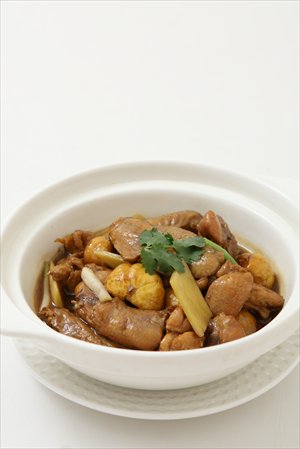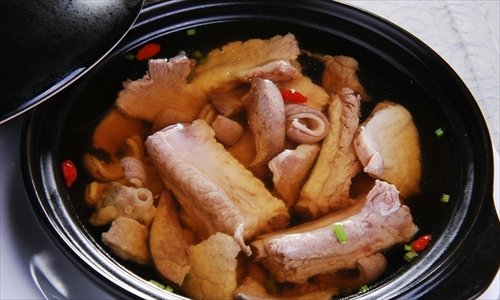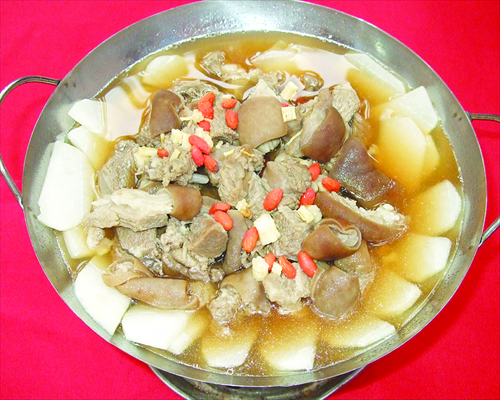Dish of the season



People in China often utter popular sayings about eating for the season, reminding each other that one should jinbu, or eat nourishing food to build up one's health, in the winter to be strong enough to take on a tiger in the coming year. According to Traditional Chinese Medicine (TCM), the practice of jinbu in the colder months can help prevent illness in the following year. As the weather gets colder, Chinese all over the country will be preparing for the season by eating nourishing food.
Friendly advice
Chinese know to jinbu in winter by mainly eating foods that reinforce yin energy, which is cold, dark and wet. Its counterpart, yang, is hot, bright, and dark.
"Jinbu in this season should give priority to reinforce yin, and thus to reserve the yang," said Dong Hongtao, a practitioner at Shanghai University of TCM and author of the book Choosing Traditional Chinese Medicine. "According to TCM theory, if yin fluid is ample, then yang can be well stored in the body. Otherwise, yang can easily lapse."
According to Li Yanling, director of the Nutrition Department at the First Teaching Hospital of Tianjin University of TCM, the best food for jinbu during this cold season is any kind of bao (slow-cooked or stewed food). "Stewed foods are heated gradually with a low flame," Li told the Global Times. "They not only can warm the body, but their ingredients are generally very soft by the time they are served, which is good for the stomach. The method also retains the nutritional value of the foods."
Jinbu in winter is like maintaining a car, mainly providing what the body needs to support its various functions. However, one needs to know how much fuel to add, what kind of fluids are needed, and when. It is very important to eat nourishing food properly, or else it can be harmful to jinbu. Not every body needs the same things, so a little help on how to choose good winter food is necessary.
As TCM practitioner Hong Nan, of Beijing Hong Nan Traditional Chinese Medicine Academy, told the Global Times, "[Jinbu in winter] is a big matter, and we need to make different choices according to our different constitutions." Given this good advice, here are a few kinds of bao that are suitable for jinbu in winter according to gender and age.
For men
In TCM theory, harsh cold tends to harm kidney energy. Men in particular are afflicted by a deficiency of kidney energy. Thus, fortifying the kidneys becomes the key goal for men in their quest to jinbu in winter. In cold weather months, men should eat nutritious, warm food that gives these hard-working organs a boost.
"Beef and mutton [are the most suitable]," traditional Chinese medicine doctor Wei Jiachen told the Global Times.
So a nourishing stewed mutton bao is a good choice for men this season. First, stew the mutton in a pot, seasoning with some salt and pepper. Be sure to reserve the juices after the mutton is cooked. Next, prepare some taro, Chinese yams, white radishes, carrots and abalone mushrooms and dice them into cubes of a side length of about 2 centimeters. Boil the radishes and carrots, while frying the other vegetables. Put the cooked mutton in a bowl, add the taro, Chinese yams and abalone mushrooms over the meat. Invert contents by turning them out into a heated tureen. Pour the mutton broth over ingredients and decorate by adding boiled radishes and carrots around the rim. Keep the tureen warm over a very low flame for a while, then this kidney-fortifying bao will be ready for serving.
For women
Female readers are likely to be concerned with the effect that winter has on their skin. The cold air can wreak havoc on even the most carefully maintained complexion, as in winter many women suffer from yin and blood deficiency, making skin pale, ragged and susceptible to blemishes.
"Jujube is an excellent food for women to reinforce yin and blood, and thus is essential in winter," Sun Wei, a doctor at Jiangsu Province Hospital of TCM, told the Yangtse Evening Post.
Women will benefit from eating a sweet carrot and pork bao with candied jujube. Prepare some carrots, sugarcane, pork and jujubes. Peel carrots and sugarcane and cut into sections. Rinse pork and cut into thick strips. Place all ingredients into a clay pot and add some broth. Stew over a low flame for one to two hours and season to taste before serving.
As you enjoy the flavor, remember that your skin will keep its rosy and smooth look as jujube reinforces yin and blood, and sugarcane produces saliva and counters dryness.
For children
Children seem very prone to falling ill during the colder months, so parents need to be extra vigilant of their little one's diet in winter. Small children do not have much subcutaneous fat and their body surface area is large compared with their weight, which means that they are more likely to lose body heat.
While they need to consume high-energy foods, especially as their parents guide them to jinbu in the winter months, their gastrointestinal systems are still immature and weak, so their food should not be too greasy.
For this reason, experts recommend chicken as an ideal source of nutrition for little ones.
Here is a delicious way to make a chicken and chestnut bao that is ideal for serving to children. Peel some chestnuts and dice some raw chicken. Heat oil in a frying pan and add the cubed chicken and some ginger slices. Fry them together for a while and add some green onion sections, as well as soy sauce, sugar and cooking wine. Heat until the chicken is done. Remove the ginger and onion and put the chicken into a pot. Stew chicken in some broth until it is completely cooked and soft. Then add the chestnuts to braise them with the chicken for a while. Turn up the heat at last to boil off the excess broth and drizzle some sesame oil onto the ingredients. Bon appétit!